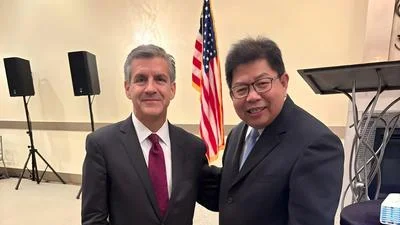A federal judge has denied a preliminary injunction that would have temporarily blocked Bolingbrook High School from allowing biological male students access to female restrooms, prompting an immediate appeal to the U.S. Court of Appeals for the Seventh Circuit.
The ruling, issued Sept. 30, stems from a class-action lawsuit filed Aug. 1 in F.F., a minor, by and through her father, James Ellard Fisher v. Valley View CUSD 365U, et al.
Filed in the Northern District of Illinois, the lawsuit accuses the school of violating the Equal Protection Clause of the Fourteenth Amendment and Title IX of the Education Amendments of 1972.

Ajay Gupta, Illinois House District 41 candidate.
| Ajay Gupta
It alleges a female student’s rights were violated when she encountered a male student in a girls’ restroom in 2024 at Bolingbrook High School, part of Valley View District 365U, which operates 20 schools and serves about 15,000 students.
The complaint argues the policy allowing biological males access to female spaces creates a hostile environment and subjects female students to unequal treatment and privacy violations.
Ajay Gupta, a Harvard-educated attorney and Republican candidate for the Illinois House, is representing the student, identified only as “F.F.,” her family and a broader class, pro bono.
Gupta said the school district’s lack of transparency regarding restroom access policies poses serious risks.
“It is purposely ambiguous and vague because I don't think they tell anybody no,” Gupta told the DuPage Policy Journal. “Even though the motion for a preliminary injunction was denied, the litigation will continue at the district court stage. When we get to discovery, we're going to ask them how many applications or requests they received and how many they denied.”
“This is a case against Valley View School District,” Gupta said. “The client is a minor, so the action is anonymous, but the action is being brought on behalf of the minor female student and all other female students at Bolingbrook High School.”
“The action stems from an incident in November of 2024 when the named plaintiff, who is a minor and therefore identified only by her initials, F, encountered a male student in the girls' restroom. The student she encountered is an obvious male who presented himself as male—described in our complaint as a biological male and also a social male student.”
According to the complaint, F.F. experienced panic and humiliation during the incident. The male student, described as “dressed in typical male clothing,” was standing near her stall in a multi-use restroom. Fearing she had been seen undressed, F.F. fled and later told her father.
Fisher filed a formal Title IX complaint, which the school district dismissed. In a June 2025 letter, the district said F.F.’s fears were “purely speculative and not based on fact.”
Gupta contends the district has no formal or transparent criteria for determining which students may access restrooms designated for the opposite sex. He argues the lack of a written policy leaves female students vulnerable.
“It’s a very minimal ask,” Gupta said. “All we are saying is: school district, be transparent. Tell us exactly what you need before you tell a male student that he can access female-only spaces. Female-only spaces exist for a reason, and that reason is to keep males out.”
Gupta said school officials initially claimed only one male student had access through an Individual Development Plan, or IDP. However, in a March 2025 meeting, officials reportedly said they did not know how many students had been granted such access.
“Initially, he was told there was only one male student granted access and only to the girls’ restroom, not the locker rooms, changing rooms, or showers,” Gupta said. “But at a March meeting with the superintendent and Bolingbrook High School’s principal, he was told they didn’t know how many male students had been granted access.”
“All of these students are granted access pursuant to Individual Development Plans (IDPs). Even if we reviewed all these IDPs to tally the numbers, we still wouldn’t be able to disclose them—so what’s the point?” he said.
According to Gupta, during oral argument, the district’s attorney, Darcy Proctor of Tressler LLP, said the school is not legally required to establish minimum standards for restroom access.
“During the oral argument, I pressed this issue, and the school district’s attorney specifically said, ‘No, we cannot be compelled to put a minimum legal floor.’ That’s the expression she used—legal floor,” Gupta said.
The lawsuit seeks to bar the school from allowing biological males access to female-only spaces unless a publicly available policy defines the criteria for access.
“We're not saying you can't grant access,” Gupta said. “We're simply saying tell us what criteria you consider before granting access, because we have no idea what you look at.”
“If it is simply based on a self-declared preference, like ‘today I feel like going to the girls' restroom and therefore I should be allowed to go,’ then that is, at a minimum, arbitrary and constitutes sex-based discrimination,” he said.
Gupta has appealed the denial of the preliminary injunction to the Seventh Circuit.
“The court denied the motion for a preliminary injunction,” he said. “Such a denial is called an interlocutory order, which means it can be immediately appealed, so we have appealed it to the Seventh Circuit.”
Under Title IX, the plaintiffs argue the district created a hostile educational environment by subjecting female students to “the constant risk of encountering males in supposedly female-only facilities,” resulting in “pervasive anxiety, humiliation, distress, and disruption of their education.”
The lawsuit also contends that the school’s policy is not narrowly tailored.
“While accommodating male students’ gender identity may be a legitimate interest, the policy fails to balance this interest with the privacy and safety rights of female students, as evidenced by the failure to offer single-use gender-neutral facilities,” the complaint states.
Gupta said the district’s lack of clear enforcement mechanisms raises further concerns.
“All of this is done with independent development plans, and we can't even tell you how many students have been granted access,” he said. “How do they enforce it? How does school security know which student to grant access and which not to?”
He said in this case, the male student was granted access to the girls’ restroom, but not other female-designated facilities.
"Surely there is no consistent gender identity there. It's not like he's a female on Monday and then stops being a female on Tuesday, Wednesday, and Thursday," Gupta said.
The school district has cited non-regulatory guidance from the Illinois Department of Human Rights, which interprets the Illinois Human Rights Act to prohibit questioning a student’s gender identity.
“The state of Illinois has issued non-regulatory guidance, which means it doesn't have the force of law, but it reflects their interpretation of the Illinois Human Rights Act,” Gupta said. “That guidance closely aligns with what the school district is saying: if someone requests access, schools can't even ask for documentation. As a result, school districts are caught between a rock and a hard place.”
Gupta argues that federal law supersedes state guidance.
“What we told the court is that you can't rely on Illinois law,” he said. “Illinois law is irrelevant for this purpose, and to the extent it contradicts federal law, Illinois law has to give way.”
He also criticized how the term “transgender” is applied in practice.
“Here’s exactly what’s happening, somebody comes up and says, ‘I need access to the girls’ room,’ and simply by demanding access, they’re termed transgender,” he said.
“The term ‘transgender’ has become totally conclusory, and it’s a word to hide behind,” Gupta said. “It’s a term that gives them complete immunity. So they don’t have to reveal anything.”
“We’re just asking them to flesh out what that means. When do you decide somebody’s transgender?”
Gupta emphasized that the case is not about denying rights but ensuring fairness and clarity.
“This is something I passionately believe in: that female-only spaces should be kept reserved for females only,” Gupta said.
He also referenced the legal standard currently in place.
“The Seventh Circuit has decided on its own to revisit it, but at least for now, the governing case law says that there is what the Seventh Circuit calls a transgender student,” Gupta said. “The way they say somebody is transgender is if somebody consistently, persistently, and insistently identifies as the other sex, then that student should be granted access to that sex's sex-segregated facilities.”
Gupta said clearer definitions are essential for fair policy implementation.
“Hopefully, in time, the Seventh Circuit will decide that it got it wrong and it'll follow the federal government's guidelines that sex means biological sex and not social sex,” he said. “But even if it doesn't do that or until it does that, students and their parents are entitled to this information. If a school district is saying, ‘Okay, we will grant access to people who identify with the other sex,’ then we need to know what identify means. And it has to be consistent identification with the other sex. It can't be whimsical.”
The case remains pending in federal court while the Seventh Circuit considers the plaintiffs’ emergency appeal.





 Alerts Sign-up
Alerts Sign-up